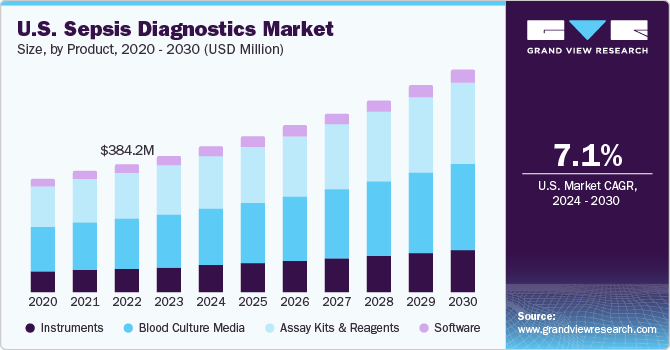Sepsis Diagnostics Market 2030 - Invest in Innovative Diagnostic Technologies
The sepsis diagnostics market is experiencing a surge in growth, driven by the critical need for faster and more accurate identification of this life-threatening condition. Sepsis sounds like a villain from a sci-fi movie, but this silent killer lurks in hospitals around the world. When the body's response to an infection goes rogue, it can lead to organ failure and death.
Sepsis, a life-threatening condition triggered by the body’s response to infection, remains a global health challenge. As bacteria, viruses, or fungi invade the bloodstream, the immune system launches a vigorous defense mechanism, leading to widespread inflammation and potential organ damage. Early detection is crucial for effective management, but sepsis often masquerades as other illnesses, making diagnosis a formidable task.
Market Overview
The global sepsis diagnostics market has been steadily expanding. In 2023, it was valued at USD 1.07 billion, and projections indicate robust growth, exhibiting a remarkable CAGR of 8.0% between 2024 and 2030. North America leads the charge, accounting for 44.4% of the global market share in 2023. However, other regions are catching up, driven by rising awareness, technological advancements, and strategic initiatives. This growth is fueled by several factors, including:
- Rising Prevalence of Sepsis: Sepsis affects millions of people worldwide each year, and its incidence is increasing due to factors like antibiotic resistance and an aging population. Early and accurate diagnosis is crucial for reducing mortality rates associated with sepsis.
- Growing Awareness: Increased public and healthcare professional awareness of sepsis is driving demand for rapid and reliable diagnostic tools. Educational campaigns and initiatives are shedding light on the severity of sepsis and the importance of early intervention.
- Technological Advancements: The sepsis diagnostics industry is witnessing the development of innovative technologies like point-of-care (POC) tests, molecular diagnostics, and biomarker-based assays. These advancements promise faster turnaround times and improved diagnostic accuracy.
- Focus on Early Detection: Rapid diagnosis is paramount for effective treatment of sepsis. The market is responding by focusing on developing rapid diagnostic tools that can deliver results within minutes at the point of care, enabling healthcare professionals to initiate treatment sooner.
Gather more insights about the market drivers, restrains and growth of the Sepsis Diagnostics Market

Why such an Urgency?
Several factors are driving this market growth. Firstly, there's a rising awareness of sepsis itself. Public health campaigns and media attention are bringing this silent killer to light. Secondly, the growing number of hospital-acquired infections (HAIs) creates a breeding ground for sepsis. As the population ages and undergoes more complex procedures, the risk of HAIs increases.
The Diagnostic Warriors
The sepsis diagnostics industry is a battlefield of innovative technologies. Traditional methods like blood tests and cultures still play a role, but faster and more precise tools are emerging. Here are some of the key players:
- Molecular Diagnostics: These tests can identify specific pathogens causing the infection, leading to quicker and more targeted treatment.
- Immunoassays: These detect the body's inflammatory response to infection, offering a faster turnaround time.
- Automated Diagnostics: These systems streamline the testing process, reducing human error and speeding up diagnosis.
Challenges and Opportunities
- Challenges: Despite its growth trajectory, the sepsis diagnostics market faces certain challenges. Sepsis mimics various conditions, leading to delayed diagnosis. In addition, resource constraints and variability in diagnostic accuracy pose challenges. The lack of a gold-standard diagnostic test for sepsis and the condition's complex nature can lead to misdiagnosis. Moreover, the high cost of some diagnostic tests can limit accessibility in resource-constrained settings.
- Opportunities: The sepsis diagnostics industry is actively addressing these challenges by developing more specific and affordable diagnostic tools. Advances in biomarkers, genomics, and artificial intelligence hold promise. Personalized approaches and novel assays could transform sepsis diagnostics. Machine learning (ML) and artificial intelligence (AI) are also being explored to improve the accuracy and efficiency of sepsis diagnosis. AI algorithms can analyze patient data to identify patterns indicative of sepsis, aiding healthcare professionals in making informed decisions.
The Future of the Fight
The ideal sepsis diagnostic test would be a rapid, point-of-care solution. Imagine a simple test that a doctor or nurse could administer at the bedside, giving the information needed to start treatment immediately. This is the holy grail that many companies are striving for.
Browse more reports published by Grand View Research.
- Private 5G Network Market Size, Share & Trends Analysis Report By Frequency, By Spectrum, By Component, By Vertical By Region, And Segment Forecasts, 2024 - 2030
- Robotaxi Market Size, Share & Trends Analysis Report By Propulsion (Electric, Fuel Cell), By Application (Goods Transportation, Passenger Transportation), By Component (Camera, RADAR, LiDAR), By Region, And Segment Forecasts, 2023 To 2030
Beyond the Market
The sepsis diagnostics market is at the forefront of medical innovation. As one unravels the complexities of this silent threat, collaboration among researchers, clinicians, and industry players becomes paramount. While the growth of the sepsis diagnostics market is positive, it's important to remember the bigger picture. The ultimate goal is to save lives. By enabling faster diagnosis and treatment, this market has the potential to reduce sepsis-related mortality significantly.
About Grand View Research
Grand View Research is a full-time market research and consulting company registered in San Francisco, California. The company fully offers market reports, both customized and syndicates, based on intense data analysis. It also offers consulting services to business communities and academic institutions and helps them understand the global and business scenario to a significant extent. The company operates across multitude of domains such as Chemicals, Materials, Food and Beverages, Consumer Goods, Healthcare, and Information Technology to offer consulting services.
Explore Horizon, the world's most expansive market research database
Comments
Post a Comment